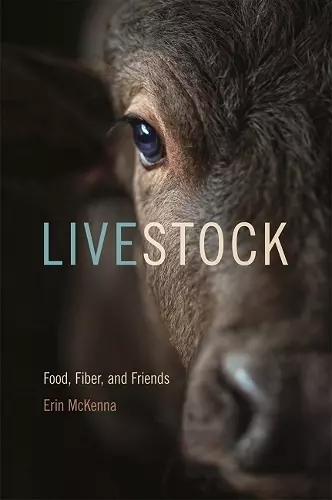Livestock
Food, Fiber, and Friends
Format:Hardback
Publisher:University of Georgia Press
Published:15th Mar '18
Should be back in stock very soon

A reevaluation of our relationship with livestock animals
This deeply informative text reveals that the animals we commonly see as livestock have rich evolutionary histories, species-specific behaviors, breed tendencies, and individual variation, just as those we respect in companion animals such as dogs, cats, and horses.
Most livestock in America currently live in cramped and unhealthy confinement, have few stable social relationships with humans or others of their species, and finish their lives by being transported and killed under stressful conditions. In Livestock, Erin McKenna allows us to see this situation and presents alternatives. She interweaves stories from visits to farms, interviews with producers and activists, and other rich material about the current condition of livestock. In addition, she mixes her account with pragmatist and ecofeminist theorizing about animals, drawing in particular on John Dewey’s account of evolutionary history, and provides substantial historical background about individual species and about human-animal relations.
This deeply informative text reveals that the animals we commonly see as livestock have rich evolutionary histories, species-specific behaviors, breed tendencies, and individual variation, just as those we respect in companion animals such as dogs, cats, and horses. To restore a similar level of respect for livestock, McKenna examines ways we can balance the needs of our livestock animals with the environmental and social impacts of raising them, and she investigates new possibilities for human ways of being in relationships with animals. This book thus offers us a picture of healthier, more respectful relationships with livestock.
Erin McKenna argues for an ecological or ‘biocentric’ perspective on ‘livestock animals.’ In her interviews of livestock farmers and observations of their farms, she investigates human ways of being in relationship with animals raised for human consumption and contextualizes these relationships within their broader natural environments. Then, examining these contextualized relationships through the dual lens of pragmatism and ecofeminism, she develops a picture of healthier, more respectful relationships with the animals we know as ‘livestock.’ After reading this book I better appreciate the complexity and interrelatedness of agricultural ecologies and economies.
A rigorous and crossdisciplinary work that is accessible and highly effective at sparking discussion and reflection about the animals that are called 'livestock.' This text would shine as a core reading for a course about animal ethics or food ethics that incorporates philosophy and/or case studies.
* CHOICE *Livestock: Food, Fiber, and Friends contributes a pragmatist and ecofeminist perspective on livestock to animal and environmental ethics literature, challenging readers at every turn to avoid the kinds of absolutist thinking characteristic of our public discourse about the lives of animals often seen merely or primarily as food or fibre for humans … The extent of the audience to whom it speaks is, arguably, everyone who eats anything at all.
* Environmental Values *What we need, and what this book demonstrates, is a genuine commitment to meaningful dialogue and working through a deliberative process about our relationship with animals that recognizes the urgency of reform while also recognizing the need for respect in order to move forward.
* Journal of Agriculture, Food, and Human Values SocieISBN: 9780820351902
Dimensions: unknown
Weight: unknown
264 pages